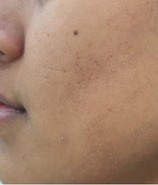Up to 25% OFF on Selected Treatments
-
Treatments
Acne and Scar
Pigmentation
Laser Hair Reduction
Dermato-surgery
Body
Anti Aging
Skin Rejuvenation
Others
- Clinics
- Blogs
Treatments
Blemishes on the face can be frustrating, whether they are acne scars, dark spots, or red patches. They often affect our confidence and can be challenging to treat. However, with the right approach and consistent care, you can significantly reduce their appearance and achieve clearer, smoother skin. Here’s a comprehensive guide on how to get rid of blemishes on your face:
Blemishes on the face are spots, marks, or skin discolorations resulting from acne, whiteheads, blackheads, or pimples. They can include scars, dark spots, and red or inflamed areas. Blemishes are common and can develop anywhere on the skin, but they are most frequently found on the face, back, chest, and upper arms, or any body part with hair follicles or open pores. These blemishes are caused by many factors, such as hormonal imbalance, environmental changes, and many others, resulting in inflammation, excess oil production, and skin trauma. So, understanding its types is crucial for determining the blemishes treatment.
There are various types of face blemishes such as:
Let’s find out the common culprits that contribute to skin imperfections and understand the root cause of blemishes on face:
To remove blemishes on face and achieve clearer skin, we require a multi-faceted approach. Here are some effective remedies that promote skin healing and rejuvenation:
Remember: Consistency is key!!!! To see noticeable results, perform these effective remedies at least for 4-6 weeks.
While mild face blemishes can be effectively treated using natural remedies, severe cases like acne with inflammation, deep scars, blemishes that do not respond to over-the-counter treatment, and terrible itching require professional interference.
Dermatologists can diagnose the root cause of blemishes on the face and recommend professional treatments.
Topical Medications:
Oral Medications:
Chemical Peels:
Laser Toning:
It is a non-invasive laser treatment that targets melanin in the skin to reduce pigmentation irregularities and improve skin tone and texture. It works by delivering low-energy laser pulses to the skin’s deeper layers, stimulating collagen production and promoting cellular turnover. Laser toning is effective for addressing blemishes, sunspots, melasma, and uneven skin tone, with minimal downtime and discomfort.
Microdermabrasion:
Microdermabrasion is a non-surgical procedure that uses a handheld device with a diamond-tipped wand or abrasive crystals to gently exfoliate the skin. By removing the outer layer of dead skin cells, microdermabrasion helps to improve the overall texture of the skin, reduce the appearance of blemishes, and promote a smoother, more radiant complexion. It is often used to address concerns such as acne scars, fine lines, and hyperpigmentation.
Micro-needling:
Micro-needling, also known as collagen induction therapy, involves the use of a device with fine needles to create tiny punctures in the skin. These micro-injuries stimulate the skin’s natural healing process, leading to increased collagen production and skin regeneration. Micro-needling helps to improve the texture of the skin, minimize the appearance of scars, and enhance overall skin quality. It can be particularly effective for addressing stubborn acne scars and blemishes.
These before and after images showcase the real results achieved by an individual at Evenly Clinic who successfully addressed their blemishes.


The cost of the blemishes treatment varies depending on the severity, type of treatment, location, and expertise of the dermatologist. Over-the-counter treatments are affordable, and professional treatments require a significant investment. A dermatologist will give you a clear picture of the cost and treatment for your specific needs.
Understanding Side effects
Most blemishes treatments are safe without any side effects, but some may cause temporary side effects, such as:
Discussing all possible side effects with your dermatologists is crucial before starting the treatment.
Face Blemish Prevention Tips
The right skincare routine and professional treatments can achieve radiant and healthier skin. By understanding the causes of blemishes and taking appropriate treatment, you can regain a flawless complexion. Don’t let blemishes hold you back. If you notice any blemishes on your face, consult a board-certified dermatologist and get the proper treatment for clearer and healthier skin.
Book an appointment with Evenly Clinic and step towards clear and healthier skin.
For health-related information, follow us on Instagram
Click here for online consultation
What are blemishes on face?
Blemishes on the face refer to a variety of imperfections on the skin, such as acne scars, dark spots, uneven texture, and redness.
Can blemishes be removed permanently?
No, in certain conditions, but with the proper treatment and consistent care, it can be minimized. There has been a noticeable improvement for many patients.
How can I treat blemishes on my face naturally?
Natural ingredients like aloe vera gel, tea tree oil, lemon juice, turmeric, and honey can help treat mild blemishes naturally due to their anti-inflammatory and soothing properties.
What foods help to clear blemishes?
To clear blemishes on the face, a balanced diet rich in fruits, vegetables, nuts, lean protein, and whole grains can help clear the blemishes.
Can blemishes on the face be prevented?
Taking a balanced diet, maintaining a healthy skincare routine, getting adequate sleep, staying hydrated, and avoiding excessive exposure to sunlight and stress management can help prevent blemishes on the face.
When should I consult a dermatologist for blemish treatment?
It is advisable to consult a dermatologist if you experience severe blemishes on your face, even after trying home remedies for inflammation and irritation.
We hope this information has been helpful. If you have any skin and hair-related questions or would like to discuss personalized solutions, please reach out to us at 7337899030. Our team of experts is dedicated to providing personalized care that meets your unique needs. Take the first step towards a healthier, more confident you by scheduling a consultation with us today. Your journey to vibrant skin and stronger hair begins here.
Book an Appointment
Start your journey to healthy skin and hair today.
Leave a Comment